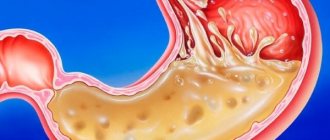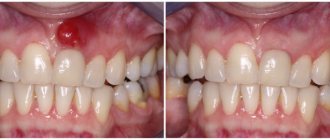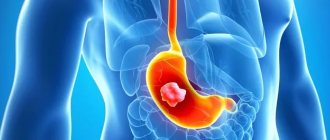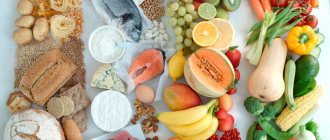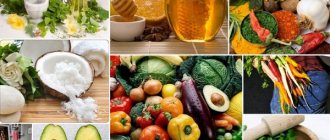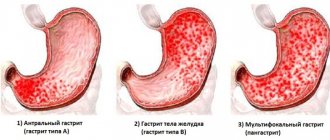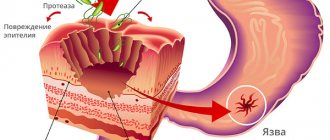Human gastric juice contains hydrochloric acid. It is necessary for digesting solid food and neutralizing bacteria that enter the body with food. But sometimes too much acid begins to be produced, and it cannot all be neutralized during the digestion process. Then it corrodes the walls of the stomach and causes various digestive disorders and diseases of the gastrointestinal tract. Many people face this problem, so the question of how to reduce stomach acidity is very relevant. Some people live with this problem for years, occasionally taking medications. But this can lead to serious stomach damage. Therefore, you need to be able to recognize the onset of the disease in time.
Symptoms of high acidity
- Feeling of heaviness in the stomach.
- Heartburn and sour belching.
- Abdominal pain, which can occur immediately after eating or on an empty stomach.
- Frequent constipation.
- Nausea and indigestion.
If these symptoms increase after eating sour and bitter foods, pickled, spicy and fried foods, then you need to think about how to reduce stomach acidity. The most important thing for this is not taking medications, but changing your eating habits and lifestyle.
What foods will help reduce acidity?
Rules for compiling a dietary menu: exclusion of foods that provoke the release of stomach acid when introducing neutral
When a person is diagnosed with “increased secretion of gastric juice,” at first he refuses to take seriously the importance of following a dietary diet. The diet remains the same, and if heartburn attacks occur, the medicine prescribed by the doctor is taken. But there comes a time when drugs no longer help get rid of pain and discomfort.
The diet for people suffering from an unpleasant symptom is based on the principle of maximally sparing the stomach; it is similar to the diet for gastritis with high acidity - this is table No. 1. But there are also differences. The main one is the duration of the diet. For gastritis, it is three weeks; for hypersecretion of gastric juice, a healthy diet must be adhered to constantly. The slightest deviation can lead to a deterioration in the patient’s well-being.
You can eat only those foods and in those combinations that do not stimulate additional release of stomach acid, but, on the contrary, reduce its secretion.
Role played by:
- method of preparing the dish;
- temperature;
- consistency of finished dishes;
- serving size;
- frequency of meals.
Patients become upset when they begin to realize that now most of their favorite, familiar foods are prohibited. But there is good news: approved products are available, inexpensive, and their list is quite extensive. If you show your imagination, you can actually cook a lot of goodies from them.
| Authorized Products | Prohibited Products |
| Cereals – rice, semolina, oatmeal, buckwheat | Millet, barley groats |
| High quality pasta | Legumes and white cabbage |
| Root vegetables – beets, carrots, potatoes | Onions, garlic, raw horseradish |
| Pumpkin, zucchini, cauliflower | Sour fruits and berries |
| Non-acidic berries and fruits | Baking |
| Lean meat, poultry | Chocolate and confectionery |
| Sea and river fish of white varieties | Smoked meats and lard |
| Eggs | Sausages and canned food |
| Low fat dairy products | Hot sauces and seasonings |
| Cottage cheese and mild hard cheese | Rye bread |
| Pastila, marshmallow | High fat dairy products |
| Dry cookies, biscuits | Fatty meats – pork, lamb |
| Yesterday's wheat bread | Fatty fish, herring, sprats |
Obviously, there are no products that reduce acidity: products are offered that will not cause its increase. These are used to formulate the patient's diet.
Remember: You should review your eating habits. It is recommended to refuse a morning cup of tea, coffee or cocoa instead of breakfast, and you should not drink drinks immediately after meals. You can wash down your meal with a couple of sips of regular still water. Drinking juice, compote, tea is allowed 1-1.5 hours after a meal.
What Causes High Stomach Acidity?
Most often, this problem occurs in people who are addicted to fatty and fried foods, spicy and sour foods. Alcohol, coffee and chocolate, tea and cola, as well as excess consumption of sugar, confectionery and citrus fruits lead to increased acidity. Overeating, especially at night, also causes the release of hydrochloric acid. This problem affects people who are accustomed to snacking, irregular meals and fast food. Often such symptoms occur in people exposed to stress and constant worry.
Etiology
Acidity is the specific level of hydrochloric acid that the gastric tract contains. The production of acid in the stomach is facilitated by special glands that are located on the mucous membrane of this digestive organ.
When disruptions occur in the activity of the glands, an increase or decrease in acidity levels is observed. Low acidity requires medications that can increase it. As for the increased level, we need appropriate drugs to reduce acidity, as well as folk remedies.
Treatment is selected depending on the cause of the pathology. As a rule, such symptoms are provoked by gastroenterological ailments. The reasons for increased acidity may be the following:
- peptic ulcer of the duodenum and stomach;
- gastritis, especially in acute form;
- reflux disease;
- failure in the endocrine system;
- stomach cancer;
- diseases of the cardiovascular system;
- hernia in the thoracic region, namely in the esophagus;
- pathological processes in the liver, pancreatic gland;
- burn of the mucous membrane in the gastrointestinal tract;
- poisoning.
In addition to pathologies, other unfavorable factors can also influence the increase in acidity. This can occur due to overeating, improper and irrational nutrition. Frequent snacking on the go, abuse of fast food, and dry food have a detrimental effect on the functioning of the digestive system. Alcoholic drinks, strong tea and coffee, and smoking can also provoke an increase in acidity. Most often, the cause is stress, neurosis, vitamin deficiency, as well as long-term use of certain medications.
How to reduce stomach acidity
If you are one of those people with such eating habits or notice symptoms of hyperacidity, you need to see a doctor and get tested. Based on its results, you will be diagnosed and treated. Various medications are used to reduce the production of hydrochloric acid.
You can reduce the acidity of the stomach by taking the drugs Maalox, Almagel or Gastal. The drugs “Zantac” or “Vicalin” are also used for this. You can alleviate your condition by taking medications that regulate digestion. Most of them are sold without a doctor's prescription, for example, Mezim, Festal or Pancreatin tablets. But you can completely get rid of high acidity only through diet.
Basic recommendations (except nutrition)
For treatment to be effective, you must adhere to certain rules:
- maintain personal hygiene and monitor the condition of the oral cavity;
- timely treat inflammatory and infectious diseases of the gastrointestinal tract;
- take any medications strictly under the supervision of a doctor;
- from the nervous system - avoid stressful situations, try not to be nervous and enjoy life;
- give up bad habits (smoking and drinking alcohol).
Return to contents
Use of medications
Self-treatment of high acidity in the form of dietary nutrition is effective, but short-lived. Sometimes the symptoms of the condition worsen, which becomes impossible to treat without the use of medications. Such drugs as Almagel A, Phosphalugel, Nexium and Rutacid tablets are widely used for the treatment of high acidity. Medicines eliminate stomach discomfort and relieve cramps. Suitable for both adults and children. After diagnosis, contacting a specialist and confirming the appropriate diagnosis, drug therapy can be carried out.
Folk remedies
Traditional methods of treatment are often used to eliminate the unpleasant symptoms of excessive gastric acidity. A popular remedy for heartburn is a glass of cold milk. If you don't have milk on hand, you can replace it with vanilla ice cream. Another old folk way to get rid of heartburn is this: take a few leaves of fresh or dried mint, pour a glass of boiling water and drink warm in small sips.
For increased flatulence and bloating, it is recommended to chew fresh basil leaves after meals. The simplest method of treatment is considered to be ordinary water, which should be drunk up to 2 liters per day, not including first liquid meals and drinks. Water has a positive effect on stomach acidity and water balance. So, to summarize, we can say that following all the recommendations will have a positive effect on the health of individual organs and the entire body.
At elevated pH levels, products that reduce stomach acidity are recommended. It is important to undergo an examination to determine the cause of the disorder and take the correct measures in treatment. With an increase in the production of hydrochloric acid, a person often experiences a feeling of heaviness, discomfort in the stomach and is constantly tormented by heartburn. These symptoms can only be eliminated by eating right. To do this, you need to adhere to a dietary diet, excluding dishes that increase secretion, and including those that reduce acidity.
IT IS IMPORTANT TO KNOW! Even “advanced” ulcers or gastritis can be cured at home, without surgery or hospitals. Just read what Galina Savina says and read the recommendation.
How to eat healthy
To avoid problems caused by excessive release of hydrochloric acid and its effect on the walls of the stomach, you need to adhere to some rules in your diet:
- you need to eat small meals, preferably little by little and 5-6 times a day so that the stomach does not remain empty;
— the temperature of the food should be close to the temperature of the human body; it is undesirable to eat too cold or hot dishes;
- it is necessary to abandon low-fat diets, which lead to gastritis;
— it’s better to steam or boil food, and the food should be finely chopped, you can even puree it;
— food should be chewed thoroughly and try not to overeat;
- It is not recommended to eat at night; the main food load should be in the first half of the day.
Aloe and gastritis
Among the remedies that are used to reduce the acidity of gastric juice, aloe vera occupies a special place. Aloe juice has beneficial healing properties. First of all, it helps create an acidic environment in the stomach. Recipes for preparing medicine from agave are very simple. It is necessary to dissolve half a teaspoon of agave juice in half a glass of water. It is necessary that the plant is not old.
Aloe is also taken to prevent peptic ulcers. To do this, it must be mixed with honey and butter. This tasty medicine helps boost the body's defenses.
Recipes for preparing medicines with aloe are simple and accessible to everyone.
Diet for high acidity
A person suffering from excessive secretion of hydrochloric acid needs to monitor what food he eats.
Only with the help of diet can you easily reduce stomach acidity. Products must be fresh, without added preservatives or seasonings. The basis of nutrition should be porridge and liquid mucous soups, which envelop the gastric mucosa and protect it. It is best to cook rice, oatmeal or semolina for this. Milk is beneficial as it reduces acidity well. You can also eat cheese, low-fat cottage cheese and yogurt. Include more boiled or stewed vegetables in your diet, preferably potatoes, cauliflower and carrots. You shouldn’t give up fruit either, just choose non-acidic ones. It’s good to make puree, mousse or jelly from them. You need to choose lean meat, preferably chicken, veal or rabbit. It needs to be boiled, stewed or baked, for example, to cook meatballs or steam cutlets.
It is recommended to eat the bread slightly dried. You can eat soft-boiled eggs or scrambled eggs, drink weak tea or still mineral water. This diet will help you reduce stomach acidity. Foods that lead to increased production of hydrochloric acid should be excluded from your diet, but otherwise, in the absence of symptoms of the disease, you can eat more variedly.
How to cook properly for gastritis
When choosing the right diet for gastritis, the patient must understand that the result of its effect on the body will largely depend on the methods of cooking.
Let's consider the features of preparing dietary food for gastritis:
- Diet food is prepared by boiling, stewing and steaming.
- Ready-made dishes must be soft, so the products are finely chopped and grated.
- The porridge is boiled well and then ground.
- Minced meat and fish are used to prepare various dishes.
- Vegetable oil is used to a minimum; butter is added to the dish immediately before use.
- Soups are well boiled and pureed, that is, pureed soups are prepared.
- Food is eaten warm:
- cold dishes are heated to 25 degrees;
- hot food is cooled to 50 degrees.
What is prohibited to eat
To prevent increased acidity from leading to the appearance of gastritis, you need to completely avoid:
- rich, saturated broths, especially mushroom and pork;
- coffee, alcohol and carbonated drinks;
— spicy and smoked products, seasonings and marinades;
- fried food;
- very acidic foods, such as citrus fruits, tomatoes or sorrel.
Even at a time when there is no exacerbation, you need to limit the consumption of vegetables containing a lot of fiber, such as radishes or cabbage. It is not advisable to eat vegetables raw, especially onions and garlic. You need to reduce the amount of salt in your diet, eat less brown bread and baked goods, ice cream and canned food. But even if all these rules are followed, the disease can sometimes worsen. Medicine is not always at hand, but you can reduce the acidity of the stomach with folk remedies. Herbal decoctions, tinctures, vegetable juices, sea buckthorn, ginger and cinnamon will come to your aid.
Antacid products
Some foods are natural antacids. Among the foods that reduce stomach acidity are the following:
- Milk (especially goat's milk). Drinking milk regularly will help get rid of unpleasant symptoms. It is good for the stomach to consume only natural dairy products.
Note! If a person has an intolerance to whole cow's milk, then he should not drink it. It is also prohibited to consume dairy products with preservatives for gastritis.
- Buttermilk. It is obtained during the preparation of butter. Can everyone drink it? It has been proven that it has virtually no contraindications.
- Potato juice. It can quickly reduce the acid content.
- Ginger root (it is advisable to start using it in small quantities, gradually increasing the dose).
- Juice obtained from celery.
- Dried fruits.
Interesting! How to increase stomach acidity: treatment at home
Among the foods with low acidity there are many rich in vitamins. They are very useful for gastritis. They quickly reduce stomach acidity.
How to reduce stomach acidity quickly
The most common way to do this is to drink a glass of water with a teaspoon of soda dissolved in it. This solution quickly neutralizes the acid. An excellent remedy is chalk powder or white clay. You need to mix it in water and drink this suspension twice a day before meals. You can also eat chalk powder this way. Honey water helps reduce acidity. Dissolve a spoonful of honey in a glass of warm water and drink.
Common foods will also come to your aid: carrots and potatoes. The juice from these vegetables is very good for the stomach. But if carrot can be taken without restrictions, then potato is drunk a quarter glass 3-4 times a day. Include pumpkin and red beets in any form in your diet more often. It is best to boil or bake them.
Sea buckthorn is a very effective remedy against high stomach acidity. It is good to make a decoction of the berries and drink it with honey; taking sea buckthorn oil is also useful. Don't forget about mineral water. But to reduce acidity, you need to drink alkaline water without gas before meals.
What should you consider on the menu?
Before you create your own diet, you need to familiarize yourself with the table below. The expansion is permitted by the doctor after examining and examining the patient. Sometimes people want to quickly relieve heartburn and pain due to hypersecretion, for this they look for information on which foods reduce acidity. It is impossible to achieve a fabulous cure, but slimy porridge (oatmeal), oat jelly, and taking small sips of warm milk will help improve the condition.
These products have an enveloping effect and, due to the alkaline reaction, temporarily neutralize the acid. After taking melons (watermelon, melon), as well as banana, mango, avocado, acidity also decreases, but this does not mean that treatment should be limited to them only. In fact, the result is eliminated, but not the mechanism that caused the violation.
>
Taking medications during pregnancy
Some drugs are allowed to be taken during pregnancy
Today, medications have appeared on the pharmaceutical market that are allowed to be taken while carrying a child. Doctors prescribe medications to women that contain magnesium or aluminum. They are absorbed by blood vessels in small quantities. At the same time, medications do not harm the development of the fetus, as evidenced by research data.
Some medications have a laxative effect, so they are prescribed to patients who complain of constipation during pregnancy. Antacids can eliminate complications that appear in the 3rd trimester. As for antacids that contain calcium, they are contraindicated for pregnant women for a number of reasons:
- they act for a short period of time, which requires frequent use;
- acidity may increase sharply when the patient stops taking them;
- the risk of developing milk-alkali syndrome increases.
Medications containing certain substances are contraindicated for pregnant women due to possible disruption of the metabolic process, increased blood pressure and other unpleasant manifestations. In addition, doctors prohibit the use of medications during breastfeeding. Some drugs containing magnesium or calcium are allowed to be used during breastfeeding, as they are recognized as safe for the baby. To avoid complications and deterioration of well-being, the patient should be constantly monitored by a specialist.
Effect of drugs
The main functions of the stomach include digestion and absorption of food. The glands of the stomach consist of cells that perform various actions (for example, produce acid, pepsin, form mucus, accelerate the motility of the organ). Acid-reducing tablets have different effects. Its increase is influenced by HCL. To eliminate the symptoms associated with this pathology, it is necessary to slow down the work of certain cells and parts of the abdominal cavity that accelerate the release of acid.
There are other reduction mechanisms that can quickly normalize the functions of the glands. For example, doctors advise using medications that increase mucus production and bind secreted acid. Thus, acid-regulating medications act on the patient’s body. At the same time, the drugs have different specific properties and features. Your doctor will tell you more about the effect of medications on the body.
Essential drugs
Medications that reduce acidity in the abdominal cavity are divided into 4 groups. These include:
- Histamine blockers. Medicines in this group include Ranitidine and Famotidine. Histamine blockers can dramatically reduce acid levels.
- Proton pump blockers. Lansoprazole and Omeprozole are considered the most effective agents designed to reduce acidity.
- Antacids. Medicines belonging to this category have a narrow scope of application. They react with acid. There are two types of antacids. They may or may not be absorbed. Non-absorbable medications include combination medications. These include drugs that restore balance in the stomach for a long time. Blood vessels do not absorb them. Antacids are eliminated from the patient’s body simultaneously with toxins. Drugs that are absorbed have a short-term effect. After the action is completed, acidity is produced again. This type of drug penetrates the blood vessels, sometimes promoting the formation of gases and compounds that are deposited in the organs. Possible bloating, belching, increased blood pressure, and stool disturbances.
- Anticholinergics. This type of medication includes Gastrocepin. The product is considered potent, so it should be used strictly under the supervision of a specialist.

